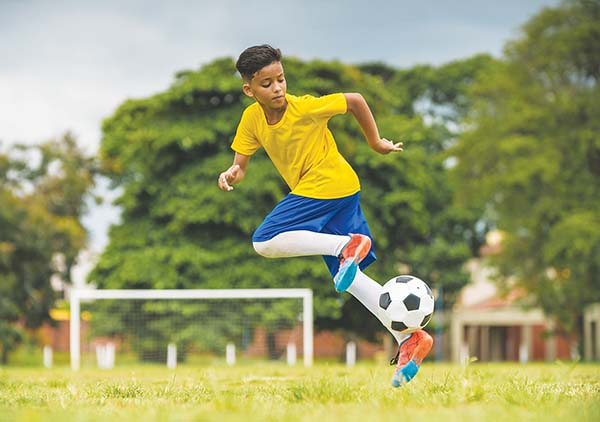The benefits of sports for children are real: Both recreational and competitive sports can be pivotal in the formation of a child’s sense of self, allowing children to create a unique identity in relation to their peers, authority figures and the world.

Participating in a sport at any level helps children understand their boundaries and limitations, how they can push themselves to grow, how to manage their time and their comfort engaging in physical contact with others. Sports make a child aware of the amazing power of the human body and what it is capable of achieving. Being in uniform allows kids to recognize their connection to others, and teams may be the first place where children formulate opinions of body image.
Sports are also a place where children form great bonds and camaraderie with teammates — they give up who they are as individuals for the greater good of the team. Learning how to work with others toward a common goal is one of the key benefits that sports teach at any age.
On the field or the court, coaches quickly become a trusted center of influence for kids at a very young age, teaching children athletic skills and philosophies that will guide them throughout their lives. It is these same positive, identity-building factors that can make sports a risky space for children.
Over the last few years, the world has seen how relationships built around athletics can be a vehicle for abuse. Athletics are not a cause, but they are a context. Just like religious organizations are not a cause for abuse, they are a context where abuse can occur. They provide a space where an individual takes a backseat to serve a higher purpose; in sports, that is the team.
In sports, risk factors are present — there is reduced supervision by parents, for example. Also, individualized attention for performance can make a child vulnerable. When factors like these are not acknowledged, understood and prevented, they can provide an environment for abuse to occur. How can parents, coaches and athletic organizations mitigate this risk?
Here are a few tips to consider:
• Parents should ask coaches and leagues about safety guidelines.
• Parents should feel comfortable talking to a coach or a league about background checks, working with children safely and mandated reporting duty.
• Parents should require that any communications or chats between coaches and children include you.
• Parents and their children should have a clear understanding to whom they can report within and outside of an organization
• Teach your children about body safety, that no person should ever ask them to keep a secret and that they can always tell you what is going on and you will believe them.
Every league should have a policy about personal relationships and discipline, should have a mandated reporting policy and should be checking coaches’ backgrounds. Coaches should never be alone with one player and should not see players outside of the regular practice time set for all. Additionally, coaches should not be texting, calling or contacting players on social media without parental inclusion.
Sports provide an opportunity for immense growth and development in children, providing them with a lifetime of skills. It is up to all of us to ensure that our fields, courts and gyms are safe spaces for all children.
For more information about how to keep kids safe, visit https://www.bcaci.org/
Drew Fidler is director of prevention and education at the Baltimore Child Abuse Center.









